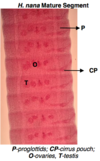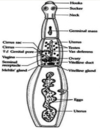Parasitology - Lab Exam 2 Flashcards
1
Q

A
NOTE: Eggs of T. saginata and T. solium
- Shell is thick and radially striated surrounding a hexacanth embryo
- Within the shell, the oncosphere has 3 pairs of hooklets

2
Q
ID microfilariae

A

3
Q

A
Hymenolepis diminuta (Rat Tapeworm)

4
Q

A
Diphyllobothrium latum ova

5
Q

A

6
Q

A

7
Q

A
Trichinella spiralis

8
Q

A

9
Q

A

10
Q

A

11
Q

A
Eye Worm (Loa Loa)
- Localized subcutaneous edema (Calabar
swellings) ,particularly around the eye - Caused by microfilariae migration and death in
capillaries
- Dying adults induce a granulomatous reaction
- Proteinuria and endomyocardial fibrosis can also
occur
12
Q

A
Wuchereria bancrofti and Brugia Malayi

13
Q

A

14
Q
Differentiation of Microfilariae in Stained Blood Smear

A
- Examine for the presence or absence of sheath (a thin, translucent eggshell remnant covering of the body of the microfilaria and extending past the head and tail.
- Examine the tail area of microfilaria for the presence or absence of cells that exhibit characteristic array of stained nucleus.

15
Q

A

16
Q

A
Brugia Malayi

17
Q

A
Hymenolepis diminuta (Rat Tapeworm)

18
Q
Identify

A
Echinococcus granulosus (Hydatid Tapeworm)
19
Q

A

20
Q

A
Diphyllobothrium latum

21
Q

A
Taenia saginata (Beef Tapeworm)

22
Q

A

23
Q

A
b. tomori

24
Q

A

25

Hymenolepis nana (Dwarf Tapeworm)

26

Taenia solium (Pork Tapeworm)

27


28


29

Angiostrongylus cantonensis
Common Name : Rat lung worm
• Most common cause of human eosinophilic meningitis.
• Final Host : Rat
• Intermediate Host : Snails & slugs

30


31

Taenia saginata (Beef Tapeworm)

32

Hymenolepis diminuta (Rat Tapeworm)

33

Taenia solium (Pork Tapeworm)

34


35

Taenia saginata (Beef Tapeworm)

36


37


38

Diphylidium caninum

39
Name large body compartments - 3


40

Hymenolepis diminuta (Rat Tapeworm)

41


42


43

Wuchereria bancrofti

44


45
46

Toxocara canis
Common Name : Dog roundworm
Disease Name : Toxocariasis
47


48

Diphylidium caninum

49

Hymenolepis nana (Dwarf Tapeworm)

50

Brugia Malayi

51


52

Angiostrongylus cantonensis
Common Name : Rat lung worm
• Most common cause of human eosinophilic meningitis.
• Final Host : Rat
• Intermediate Host : Snails & slugs

53

Hymenolepis nana (Dwarf Tapeworm)

54

Elephantiasis (Bancroft’s Filaria)
- In the early acute phase, fever and lymphangitis
- After years of repeated exposure, chronic
elephantiasis develops due to obstruction of lymphatics, lymph stasis and lymphadematous changes.
- After death of the adult worm, a surrounding granulomatous thickening the lymphatic walls are formed causing obstruction and resultant enlargement below the blocked area.
55


56

Taenia solium (Pork Tapeworm)

57

Trichinella spiralis
Habitat: Striated muscle tissue
Larva encysted in the muscle cell (called the nurse cell)
Granuloma forms around the nurse cell and becomes calcified
over time
58

Diphyllobothrium latum

59

Taenia solium (Pork Tapeworm)



